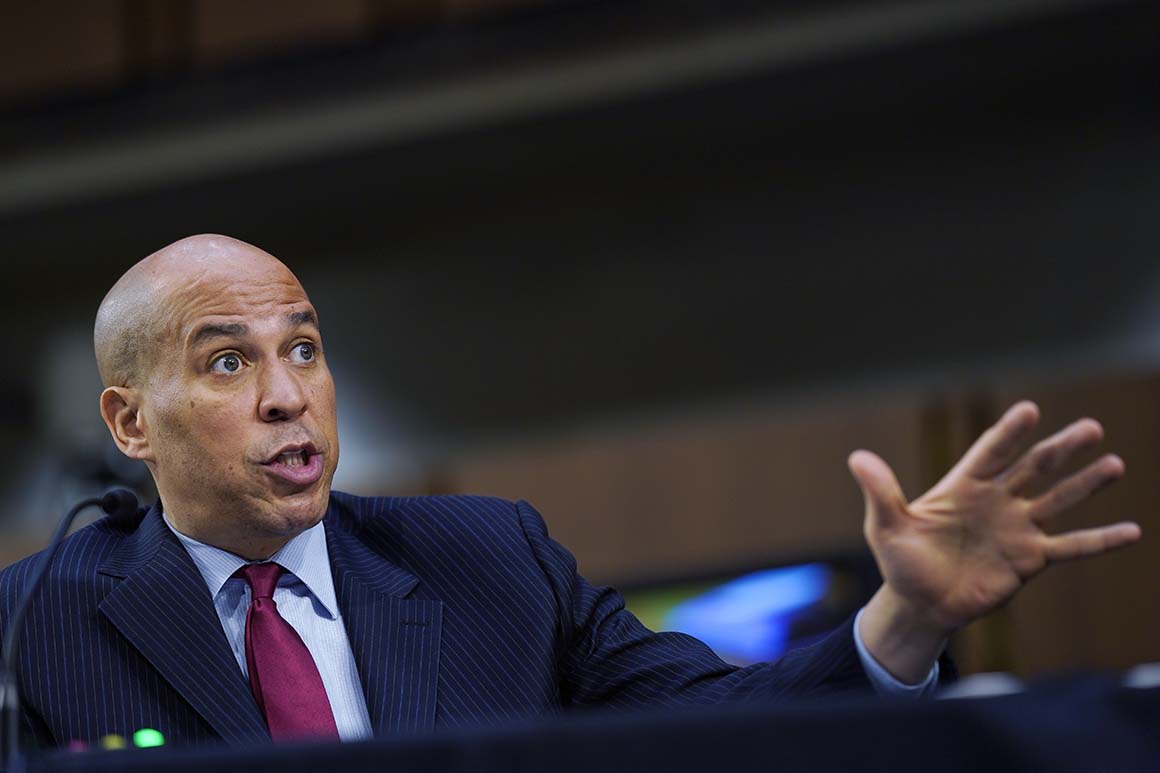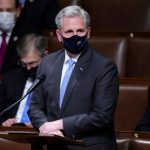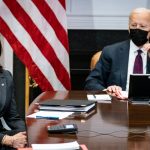Optimism began to fade this week among bipartisan negotiators who have worked for months to shape a momentous overhaul of U.S. policing after years of brutality and bias toward Black Americans.
Sens. Cory Booker (D-N.J.) and Tim Scott (R-S.C.), their chamber’s lead negotiators alongside Rep. Karen Bass (D-Calif.) and a small group of others, signaled on Thursday that they’re still a long way from agreement with only two weeks left in the Senate’s session. They had set a self-imposed deadline at the end of the month, but they’re now tripping up on many of the same issues that bogged down previous rounds of talks as outside groups amp up the pressure.
“There’s a long way to go. We have a lot of work to do. But those are all relative terms,” Booker told reporters. He dismissed the idea of operating under any set timetable and said he wanted to craft legislation “that’s worthy of this nation and the urgency of this moment.”
Meanwhile, Scott — weeks after declaring police reform talks "June or bust" — said both sides “still have a ways to go.”
Even if the two parties can reach a deal on legislation, lawmakers will face a daunting task in selling it to the multiple groups with vested interests in law enforcement policy-making, from police unions to civil rights groups. As proposed draft provisions leaked out over the week, groups trying to sway the final product dug in.
"We have grave concerns about the current draft,” said Jonathan Thompson, executive director of the National Sheriffs Association. “However, we remain open to the possibility that something balanced and reasonable is achievable."
Another person involved in the negotiations said provisions on qualified immunity in an early draft circulated by Booker were a “nonstarter.”
Draft legislation obtained by POLITICO addresses the contentious issue of qualified immunity, the legal doctrine that shields officers from civil liability for misconduct on the job, by attempting to strike a middle ground similar to a proposal floated by Scott. According to the text, “the public employer of that officer shall be liable to the party injured for the conduct of the officer in an action at law, suit in equity, or other proper proceeding for redress.”
The draft legislation also proposes criminal penalties for officers who “intentionally” use excessive force if the officer “knows” the force is excessive or “consciously disregards” risks. It’s not clear whether the draft is the most current version on the table in the talks.
Jim Pasco, the executive director of the Fraternal Order of Police, the largest police union, said in an interview he was “cautiously optimistic” about the negotiations but underscored that qualified immunity was still a major concern for his organization.
That protection for officers’ workplace behavior was an “essential element of recruiting and retaining the best qualified police officers," Pasco said, and police “should continue to be afforded protections of the doctrine of qualified immunity."
Both Booker and Scott are well-respected within their caucuses, and senators in interviews said that any agreement they could reach would likely get broad support. But Republicans have made clear that their buy-in depends in large part on where the qualified immunity debate lands.
And negotiations limited to a small group of senators mean that last-minute stumbling blocks could get in the way.
Senators aren’t working through "committees of jurisdiction where people can file amendments,” said Sen. John Cornyn (R-Texas). “That’s the way steam gets let off and people get a chance to participate in the process.”
Sen. Josh Hawley (R-Mo.) described qualified immunity as potentially the “first really big tripwire.”
“I know that a number of my colleagues on the Republican side that would have that same concern” about leaving police officers too legally exposed, Hawley said. “Would it be more than 40? I don’t know."
The draft legislation obtained by POLITICO would limit transfers of military equipment to police departments — long a goal of advocates who opposed the use of military-grade hardware by local police departments. In a provision likely to draw Republican opposition, the proposal also includes annual appropriations for developing a curriculum “on the history of racism” through the National Museum of African American History and Culture.
Any policing deal that might emerge from the current talks would also face an uphill climb in the House. Progressive Democrats there have balked at compromise proposals that they say would do less to reform law enforcment than the House-passed bill named for George Floyd, the Black man whose murder by former Minneapolis police officer Derek Chauvin inspired nationwide protests last year.
Rep. Cori Bush (D-Mo.), herself a former Black Lives Matter activist, said in a statement to POLITICO her vote depended on whether final legislation changed qualified immunity or not.
“I’ve said it before and I’ll say it again: We compromise, we die. We compromise, we die. If we compromise on qualified immunity, police officers will continue to kill Black people with impunity,” she said.
Bush and Rep. Ayanna Pressley (D-Mass.) led a group of House Democrats at the end of May in sending a letter to Democratic leadership urging them to keep qualified immunity provisions in any final legislation, and Bush is set to introduce her own police reform proposal this month.




















